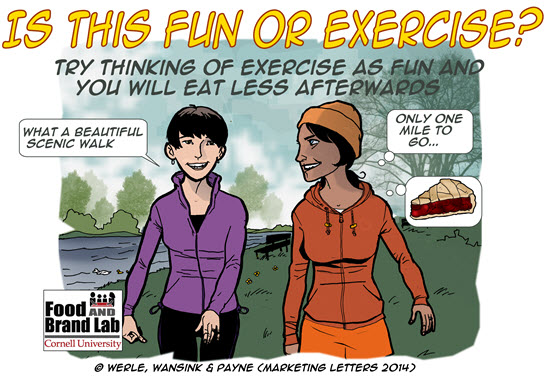
If there was every a reason for Keeping It FUN in our classes - this could be it.
I just read a short article from the latest edition of the IDEA Fitness Journal - Think “Fun” When Exercising To Eat Less Later.
If clients could meaningfully impact ingrained eating behavior by subtly fine- tuning their thinking patterns about exercise, would you try to help them do that? Consider these new findings from the Cornell Food and Brand Lab as an opportunity to move people in the right direction.
Research published recently in Marketing Letters showed that if participants thought of exercise as “fun” or a “well-deserved break,” versus a “workout,” it significantly changed the way they approached postactivity food consumption. Those with fun top of mind ate less than those who viewed exercise as a workout.
Abstract:
Do consumers eat more when they exercise more? If so, the implications could ripple through the multi-billion dollar fitness and food industries and have implications for both consumers and health-care providers. Three studies–two field experiments and one observational field study–triangulate on this potential compensatory mechanism between physical activity and food intake.
The findings showed that when physical activity was perceived as fun (e.g., when it is labeled as a scenic walk rather than an exercise walk), people subsequently consume less dessert at mealtime and consume fewer hedonic snacks. A final observational field study during a competitive race showed that the more fun people rated the race as being, the less likely they were to compensate with a hedonic snack afterwards. Engaging in a physical activity seems to trigger the search for reward when individuals perceive it as exercise but not when they perceive it as fun. Key implications for the fitness industry and for health-care professionals are detailed along with the simple advice to consumers to make certain they make their physical activity routine fun in order to avoid compensation.
I had to look up the word hedonic to be sure I understood what they meant by; consume fewer hedonic snacks. According to this online dictionary:
Adjective
hedonic (comparative more hedonic, superlative most hedonic)
What I think they are referring to here is eating as a pleasurable reward, as in; I worked out today... so now I can treat myself to carmel roll/large vanilla latte, candy bar, etc...
All of us in the USA heard (or said) this last week during Thanksgiving - we're doing a "pre-burn" ride or "I'm doing the Turkey Trot Thursday morning". The purpose of both is to give permission to indulge in hedonic eating, post workout. Problem is that even riding a hard, hour-long class will only consume maybe 300 - 800 calories. One small slice of pumpkin pie has around 300+ calories and that's without whipped cream.
So are we undermining our participants weight loss goals, with all of the metrics we offer?

I had another thought after publishing this; can (or should) we be taking ownership of our participants success or failure with their weight loss goals?
Afterall weight loss (body fat % reduction) is all about eating fewer calories than what your body needs. Without a limiting your calorie consumption, I don’t care how much you workout… you probably aren’t going to lose any body fat.